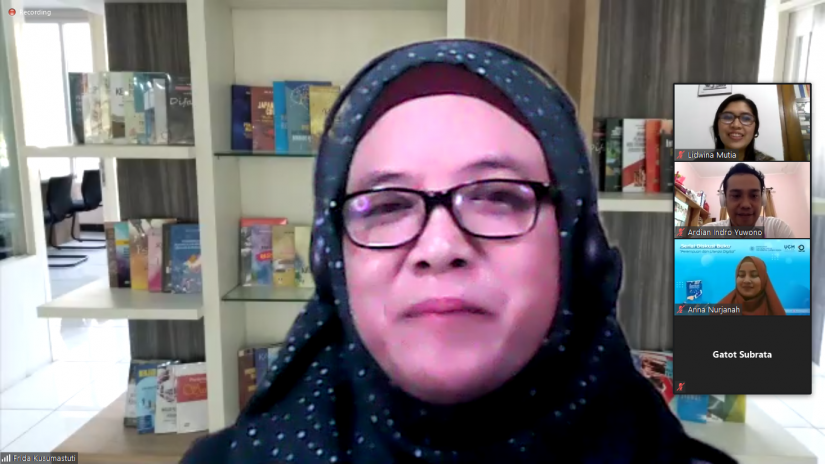
Yogyakarta, July 23rd 2021─The Department of Communication Science (Dikom) of FISIPOL UGM in collaboration with UGM Press and the Network of Digital Literacy Activists held a book discussion “Women and Digital Literacy”, on Friday (23-07). The third discussion series in this book discussion series is entitled “Field Notes: Women’s Perspectives and Experiences”. This last discussion series presented three authors as speakers, they were: Lidwina Mutia Sadasri, Mashita Fandia, and Ardian Indro Yuwono. Frida Kusumastuti, a Lecturer of Communication Studies of Muhammadiyah University of Malang, was present as the speaker in this discussion.
Frida, as a speaker, divided Chapter 3 in this book into two types of topics. “When it comes to the big theme of digital literacy, I group the writings in Chapter 3 into two,” she explained. The first was the topic of perception, acceptance, and use of technology for women which includes the writings of Dewa Ayu, Ana Nurjanah, and Ardian Indro. The second group is about the map of the women’s movement in the digital media era which includes the writings of Lidwina and Mashita Fandia. In addition, Frida also reviewed, found similarities, and differences from each writing and the reasons why she classified them into two types.
In this discussion, the three authors presented their respective writings. Lidwina as the first speaker explained about her writing on the activism of Women Tagar Tegar. The activism raised in Women Tagar Tegar is to carry out literacy on misinformation that arose around the issue of feminism by promoting equal relations.
Mashita in her writings analyzes feminist movements that have emerged on social media Instagram. Mashita sees how these movements conceptualize feminism and gender equality in the Indonesian context and how their followers interpret what they conceptualize.
Adrian as the second speaker explained about his writing which raised the topic of video games. Adrian analyzes the reason why people look for social space in video games, namely as a medium for expression, competition, and not just having fun.
